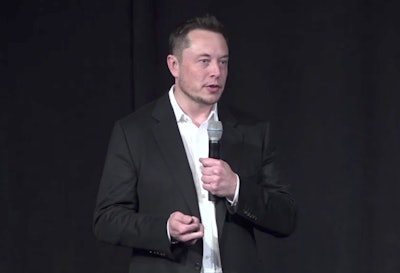
Never a dull moment.
One click and the world can seemingly make you or break you.
What else can account for Nikola’s double valuation to $27 billion in a few days following its IPO last Thursday? The automaker that’s never sold an auto is now worth more than Ford and FCA.
Other than selling T-shirts, hats and other such items on its website, the Arizona-based automaker has zero revenue.
But they do have a gifted frontman who’s on fire. Former Nikola CEO Trevor Milton, who’s now the company’s executive chairman following its IPO, is racking up more and more Twitter followers by the minute. Earlier this year, he had under 15K followers. Today, he’s up to 41K followers and counting. And he knows how to talk with them and does so daily.
 Trevor Milton, founder of Nikola Motor Company, unveiled Nikola One in December 2016.
Trevor Milton, founder of Nikola Motor Company, unveiled Nikola One in December 2016.Search for the Twitter accounts of leaders at legacy auto manufacturers and see what happens. Maybe you’ll have better luck, but I didn’t find much. Sure, they’ve got smart and capable representatives, but Milton and other emerging front runners in the auto industry, including Tesla CEO Elon Musk, keep cashing in on the value of instant and exciting mass communication. People have grown to trust them and their candor, their constant flying in the face of convention and it’s resulted in throngs of eager investors hanging on their every Tweet.
While it’s true that Musk seriously dwarfs Milton with 35.8 million followers, it’s their constant tweeting that catches the attention of influential followers–including journalists–that makes all the difference. Make an interesting if not edgy comment and you’ll get noticed which will probably lead to plenty of media coverage. Pretty simple. Plus, people are enthralled with mavericks. The fact that Nikola and Tesla are named after one of the biggest mavericks of the 20th century only adds to the intrigue.
By constantly leveraging social media, Milton and Musk have gone way beyond textbook and classroom lessons on supply and demand to constantly and personally keeping their fingers on the critical pulse of consumers around the world and stirring up demand in the process. Case in point: When asked today if it was true that Tesla was starting production on its Semi, Musk confirmed the news in a Tweet which sent the company’s stock up to over $1,000 a share. (Credit to Reuters for breaking the story). One Tweet a millionaire makes? Maybe so.
A few years ago, Musk asked his Twitter followers to let him know what they were looking for in a pickup. They responded big time. While I don’t know if Musk ended up adopting any of their ideas (some of which were very clever), what I do know is that he created an upswell of support among thousands of intelligent and influential followers in minutes—and it didn’t cost him a dime.
Milton has been doing the same thing and it’s paying off. Both men, while intense competitors, know the supreme value in ideas–no matter their source–and the fiery emotions that back them. They know the value in quickly connecting and firing up their followers. They don’t sit back and coolly observe from a sheltered cocoon where mass messaging goes through an arduous process of approval. They get their fingers dirty, so to speak, and engage in an impressive level of apparent spontaneity that keeps proving inspirational. And they don’t hesitate to get in the ring and grapple with those who have opposing views. In a word, they’re accessible and who doesn’t appreciate that? (Musk’s habit of dodging interview requests is mostly countered by his endless Tweets where he maintains more control of the message).
Some might say that CEOs and other leaders who constantly tweet just signals their desperation to remain relevant. I don’t think so. If they’ve got something of value to say, it will resonate—or not—among the connected. Twitter can turn into this sort of journaling process where followers feel like they get an inside track to powerful thoughts and decision making. And in a lot of cases they do.
So, will constant diving and canon balling into a sea of online strangers catch on with more auto industry leaders? Is social media, like it or not, the the new colosseum where automakers will have to battle it out for allegiance and critical sales? Thus far, despite their seemingly irrational valuations, neither Nikola nor Tesla can reveal a fiscal year of actual profitability. But it looks like that’ll be changing soon. One simply cannot ignore this growing demand backed by the widely held and constantly reinforced belief that driving a zero emissions vehicle means saving the world. If it doesn’t, try tweeting about it and see what happens.









